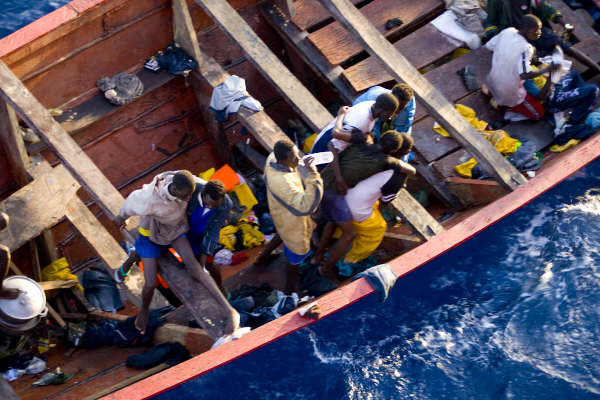News & Updates
Morocco Center of Trafficking of Filipinos to Europe
December 17, 2007
The promise of employment and a better future has forced many Filipinos to resort to illegal means just to get to Europe.
Human trafficking syndicates are now using Morocco as the center of illegal recruitment for most Filipinos trying to cross the border of Europe. The North African country has become a favorite jumping point of illegal recruiters because it does not require a visa and is just near the border of Spain.
The tourist visa is valid up to three months. Many Filipinos have already overstayed from six months to one year, hoping to get their travel documents and make it to Europe. Madel de Silva is one of them and she is hopeful she will be able to join her sister in Milan, Italy.
De Silva said that incidentally, she replaced, her other sister who initially paid P350,000, but could not wait any longer in Casablanca, Morocco. She said her sister stayed in Casablanca for two months. De Silva is with 12 other Filipinos who are living in a crowded old apartment building in Mohammedia.
They have their own stories to tell, the ultimate goal of which is to get a job in Europe. JR Negoy said his family, now in Monaco, had already spent P2 million trying to get him. His first recruiter was able to take him only up to Charles de Gaulle airport in Paris, France, but was deported for illegal documents. Sensinio Villar Jr., meanwhile, is worried of crossing the border again after he discovered that his Schengen visa is fake.
His was a tampered visa with glaring discrepancies from the original document. Sam Siatrez, meanwhile, is no longer interested to pursue his European dream after almost seven months in Morocco. He believes that part of his P400,0000-placement fee would still be refunded.
Negoy, Villar, Siatrez and seven others earlier tried but failed to cross the Tangier port via the ferryboat which is just about an hour away from Marbella, Spain. Their Moroccan guide left them after the group paid 32,000 euros (P1.99 million) to a certain Arwin Montoya. Montoya is now wanted by the Moroccan police.
Another exit point from Morocco is Tetouan, which is almost an hour away from Spain. Except for Siatrez, most Filipinos are willing to wait and even take the risks of being arrested, justifying there is no better alternative in the Philippines.
Risk-takers
Stranded Filipinos in Morocco are willing to face deportation and arrest in their desperate attempt to cross europe despite having spurious travel documents. But a handful are just lucky to make it and join their loved ones in Europe. ake the case of "Cristy" (not her real name) who was able to enter Milan after a group of Filipinos took her in shortly after arriving at the Charles de Gaulle airport in Paris recently.
Cristy has rejoined her mom, who is domestic helper for many years in Italy. Cristy left Manila July 15 after her mother paid an initial amount of P250,000 to a recruiter whom she identified as Bobby Flores. She stayed for a month in Bangkok, Thailand and another two months in Morocco. Cristy revealed the modus operandi of the illegal recruitment syndicate. In traveling, they use two bags, one for check-in and the other, the handcarry bag. The check-in bag, she explained, is only for show to make it appear that she has a final destination. This bag only contains old clothes and sleepwear. The handcarry bag is where they hide the fake travel papers, and show it to immigration authorities when exiting the transit point in Europe.
The specially-designed bag has a secret opening at the bottom portion for documents which could not be detected by x-ray machines. At least one Filipino in Morocco, meanwhile, said the legal way is still the best way for Filipinos to gain entry to Europe. Lito Porto has been helping Filipino victims of illegal recruitment for the past 12 years in Morocco.
For him, the best way is still to do it legally because its not only deportation but the harsh penalty of arrest that Filipinos will have to pay.
Adapted from: Danny Buenafe, "
Morocco center of trafficking of Pinoys to Europe."
ABS-CBN Europe News Bureau.
6 December 2007.













